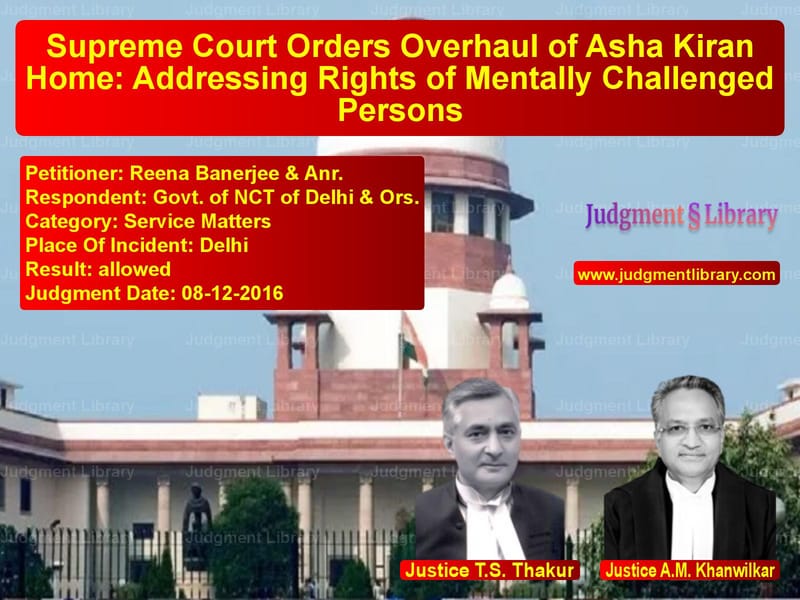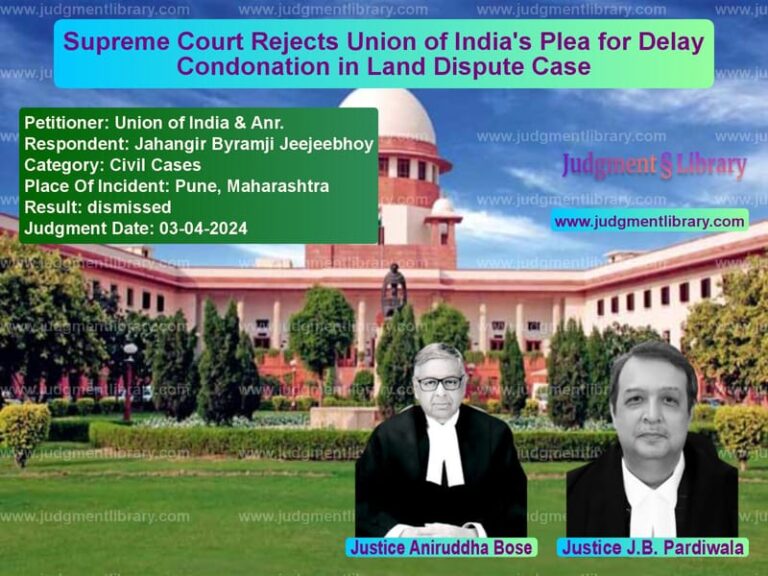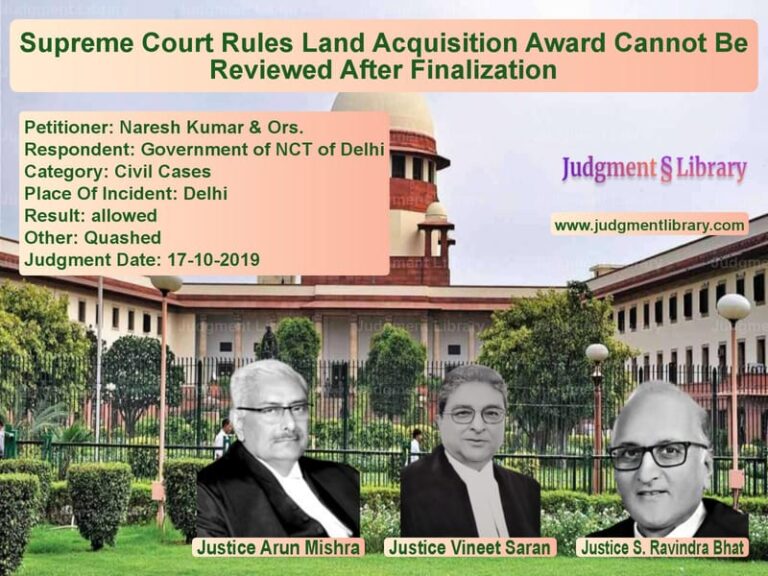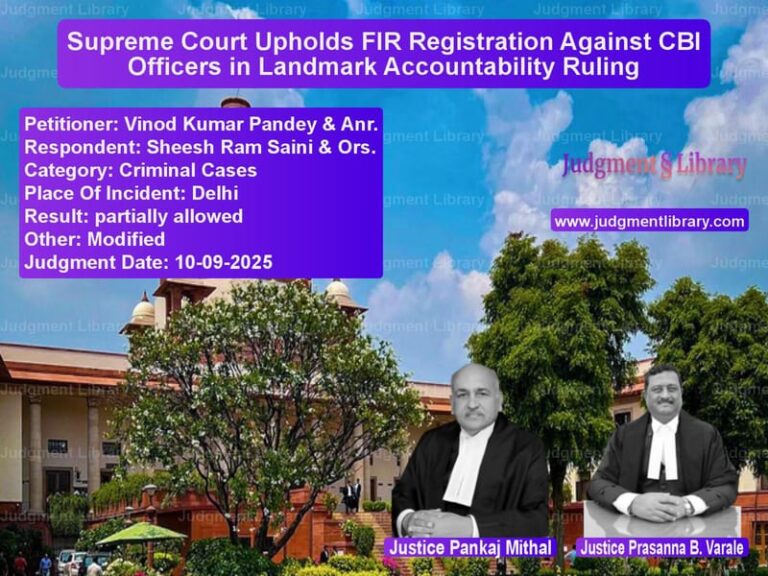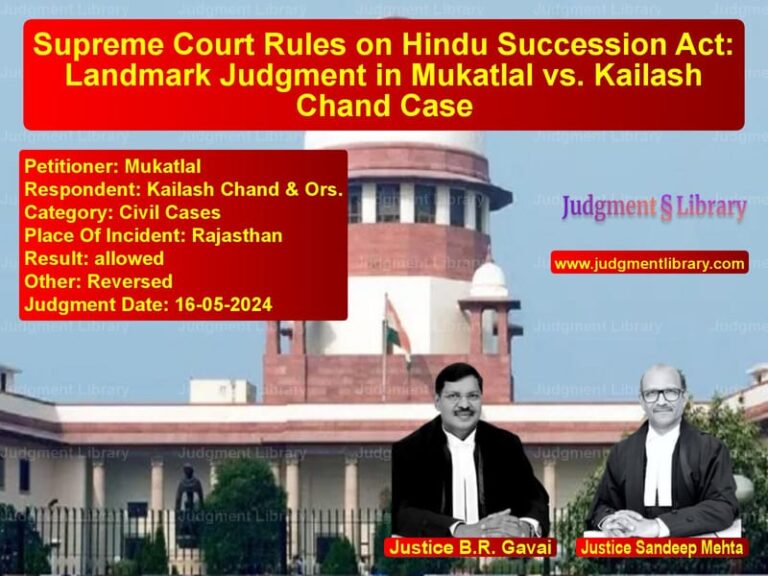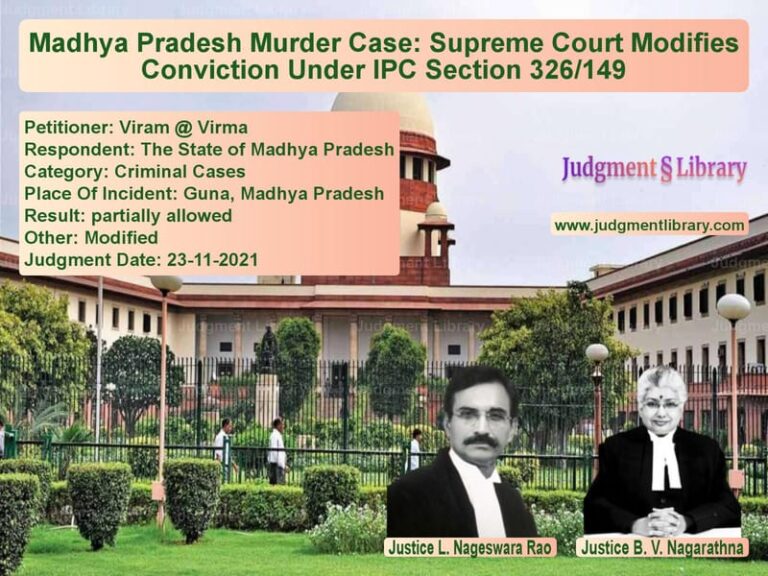Supreme Court Orders Overhaul of Asha Kiran Home: Addressing Rights of Mentally Challenged Persons
The case of Reena Banerjee & Anr. vs. Govt. of NCT of Delhi & Ors. brought to light the dire conditions of Asha Kiran Home, a government-run shelter for mentally challenged individuals in Delhi. The Supreme Court, in its judgment on December 8, 2016, addressed critical concerns regarding the treatment, facilities, and legal rights of the inmates in such institutions. The case highlighted the systemic failures in providing proper care, protection, and human dignity to mentally challenged individuals.
Background of the Case
The petitioners, Reena Banerjee & Anr., intervened in an already disposed of suo motu writ petition regarding the functioning of Asha Kiran Home. Their intervention was based on media reports exposing:
- Overcrowding in the facility, with more inmates than its sanctioned capacity.
- Inadequate medical facilities and lack of trained healthcare professionals.
- Abuse, neglect, and poor hygiene conditions.
- Instances of deaths due to negligence.
The petitioners sought directions for an impartial investigation, improved facilities, and compensation for families of deceased inmates.
Legal Issues in Question
- Whether the Delhi government had failed in its constitutional and statutory obligations under the Persons with Disabilities (Equal Opportunities, Protection of Rights and Full Participation) Act, 1995.
- Whether there was an urgent need for judicial intervention in the administration of Asha Kiran Home.
- Whether compensation should be awarded for deaths due to negligence.
- What institutional reforms were necessary to ensure the protection of mentally challenged persons.
Petitioners’ (Reena Banerjee & Anr.) Arguments
- Asha Kiran Home had failed in its duty to provide basic human rights to its inmates.
- The deaths in the facility were a result of criminal negligence, warranting a CBI investigation.
- The government had repeatedly ignored reports and media coverage on the facility’s inhumane conditions.
- Mentally challenged individuals should be given specialized care, which was absent in the institution.
- Compensation should be provided to families who lost their relatives due to the negligence of the home’s management.
Respondents’ (Government of NCT of Delhi) Arguments
- The government acknowledged deficiencies but stated it had taken steps to improve conditions.
- A new administrator had been appointed, and infrastructure upgrades were underway.
- Recruitment of medical professionals and caregivers had been initiated.
- A Governing Council was being formed to oversee operations and prevent further lapses.
- Legal actions were being taken against negligent staff members.
Supreme Court’s Judgment
The Supreme Court, led by Chief Justice T.S. Thakur and Justice A.M. Khanwilkar, issued a comprehensive ruling:
- The Delhi government must ensure immediate infrastructural improvements at Asha Kiran Home.
- A Governing Council was to be established to oversee the home’s administration.
- A multi-disciplinary committee, including experts in psychiatry and social work, must monitor the care provided to inmates.
- The state must ensure that mentally challenged individuals are treated with dignity and that staff are adequately trained.
- The state government must implement the Persons with Disabilities Act, 1995, in letter and spirit.
Key Legal Takeaways
- State’s Responsibility: Governments are obligated to protect and care for mentally challenged individuals in line with constitutional and statutory provisions.
- Right to Dignity: The ruling reaffirmed that mentally challenged individuals have the same rights to dignity and humane treatment as any other citizens.
- Judicial Oversight: Courts can intervene when the fundamental rights of vulnerable groups are at risk.
- Need for Institutional Reforms: The ruling underscored the importance of continuous oversight and independent monitoring of state-run mental health institutions.
Conclusion
The Supreme Court’s ruling in Reena Banerjee vs. Govt. of NCT of Delhi marks a significant step toward ensuring accountability and reform in the care of mentally challenged individuals. The judgment emphasizes the need for a structured and humane approach in managing state-run institutions, reinforcing the constitutional mandate of equal rights and dignity for all.
Don’t miss out on the full details! Download the complete judgment in PDF format below and gain valuable insights instantly!
Download Judgment: Reena Banerjee & Anr vs Govt. of NCT of Delh Supreme Court of India Judgment Dated 08-12-2016.pdf
Direct Downlaod Judgment: Direct downlaod this Judgment
See all petitions in Public Sector Employees
See all petitions in Judgment by T.S. Thakur
See all petitions in Judgment by A M Khanwilkar
See all petitions in allowed
See all petitions in supreme court of India judgments December 2016
See all petitions in 2016 judgments
See all posts in Service Matters Category
See all allowed petitions in Service Matters Category
See all Dismissed petitions in Service Matters Category
See all partially allowed petitions in Service Matters Category

